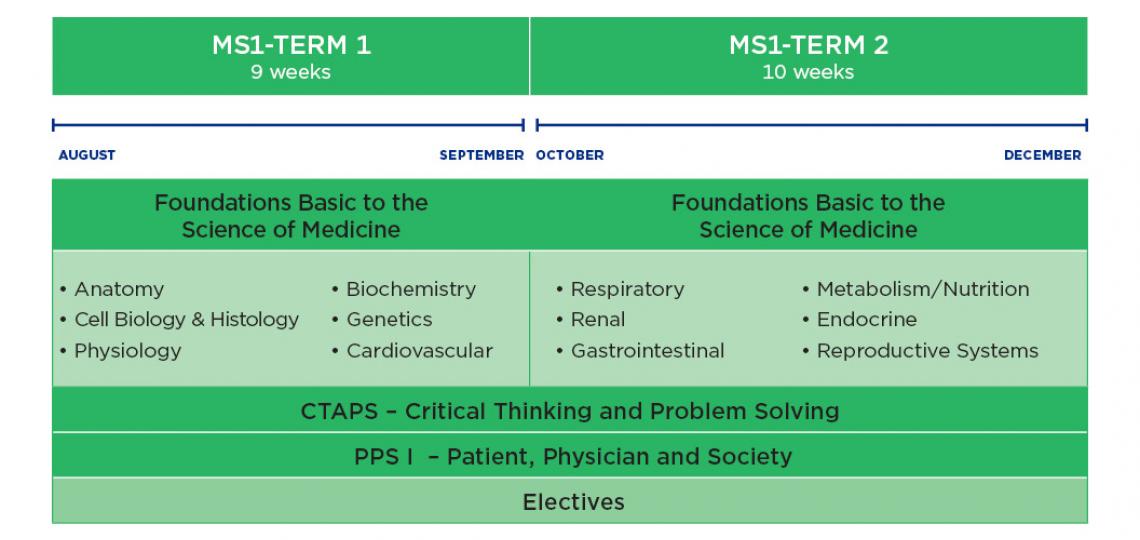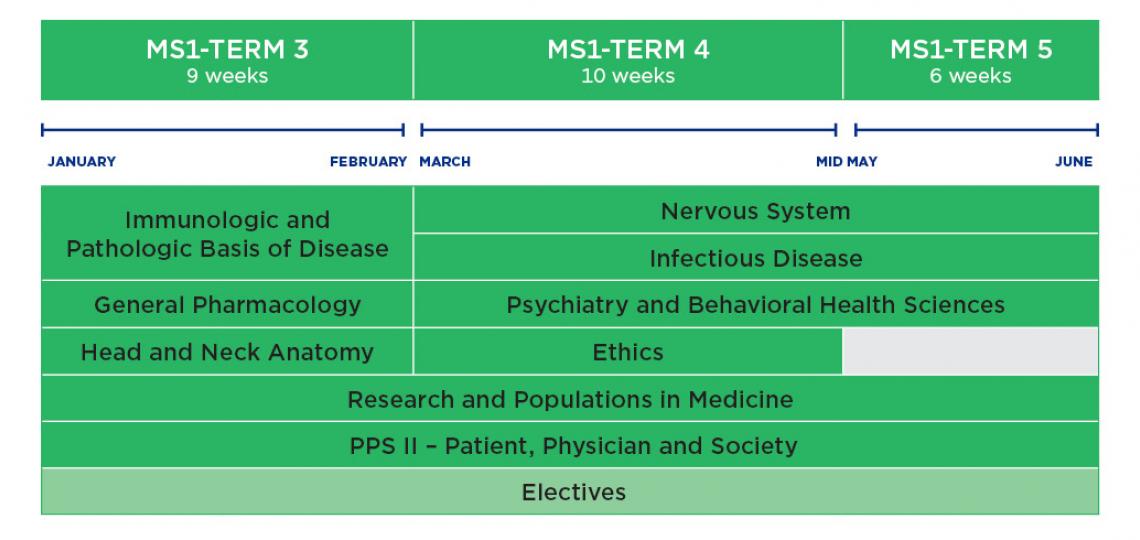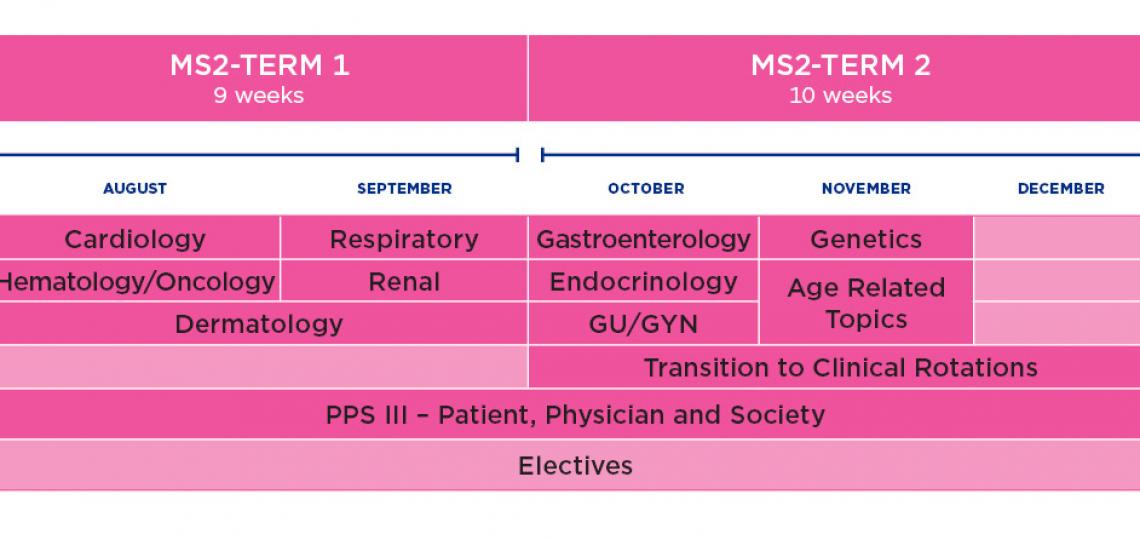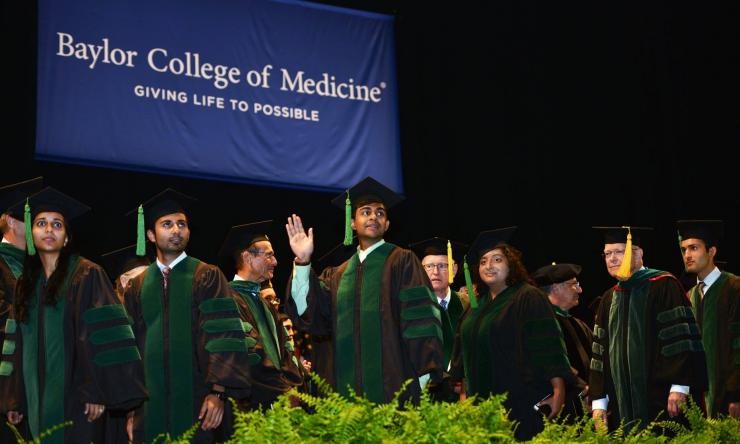For graduating class of 2024, 2025 or 2026
Our 18-month Foundational Science curriculum includes early, one-on-one patient contact, state-of-the-art technological resources, and small group settings to learn skills that make them effective.
With our integrated approach, first you learn the core scientific concepts that underlie medicine and apply these to each of the body's organ systems in their healthy state. Then you learn about pathology and pharmacology and carry these themes through each of their organ systems in their disease states.
Early introduction to seeing patients provides meaning and context as you gain the foundational knowledge required to practice medicine. You then have continued opportunities to grow and enhance your understanding of scientific concepts throughout your clinical training.
The foundational sciences curriculum is divide into three phases that extend from August of the first year to December of the second year.
Year 1- Fall

MS1 Terms 1 & 2 includes all the core basic sciences that provides the foundations for the practice of medicine. These are covered in an integrated manner in the Foundations Basic to the Science of Medicine course, which runs daily for the first five months of medical school. The Critical Thinking and Problem Solving (CTAPS) course instructs students to develop higher levels of critical thinking required for the practice of medicine. Finally the Patient, Physician and Society (PPS) course provides students with an introduction to developing clinical skills.
Year 1- Spring

MS1 Terms 3, 4 & 5 occurs from January to June and is divided into three successive teaching terms. Term 3 integrates essential pathology and immunology concepts along with general pharmacology and a continuation of head and neck anatomy. Terms 4 and 5 covers the nervous system, infectious disease, and introduction to psychiatry. Importantly, ethical concepts in medicine is also provided in Spring I. The PPS course continues and students are also introduced to translational research in medicine.
Year 2 - Fall
MS2 Terms 1 & 2 encompasses the period between August and December of the second year and consists entirely of organ-based modular teaching. These courses complete the foundational understanding of organ physiology and pathology in order to prepare students for entry into the subsequent clinical clerkship rotations. The PPS 3 course is a continuation of PPS 1 and PPS 2 with greater focus on hospitalized patients with abnormalities on the physical examination. Finally, the Transitions to Clinical Rotations course assures students are prepared for entry to clinical clerkship rotations.
Electives
Electives provide students the opportunity to explore areas of interest to them and learn more about specialties they are considering pursuing. Baylor College of Medicine offers approximately 300 elective courses, ensuring that every student can find ones that match their passions.
During the Foundational Sciences curriculum students are allowed to apply for electives for credit as outlined in the Graduation Requirements. These, as well as the rules governing electives, are all listed in the Electives Catalog.
"Adjusting to the workload in medical school is difficult where ever you go. Having the support of my Peer Resource Network, particularly the second years who shared how hard it was for them, made the transition much easier. My PRN and my mentors have helped me every step of the way. The faculty is also really helpful in providing strategies to help us master specific parts of the curriculum."
Leveraging Technology to Enhance Learning
The Anatomage table and software enhance the anatomy learning process at Baylor College of Medicine.
Graduation Requirements
View Requirements for the Degree of Doctor of Medicine and Core Competency Graduation Goals.
"I clearly saw how people's different perspectives really influenced how they initially looked at a case. Having people in the room who have had diverse experiences allowed me to gain a better view and be open to more perspectives."
Progress Notes
Wondering what medical school is really like? Follow our students on Progress Notes for first-hand perspective on the experience.










